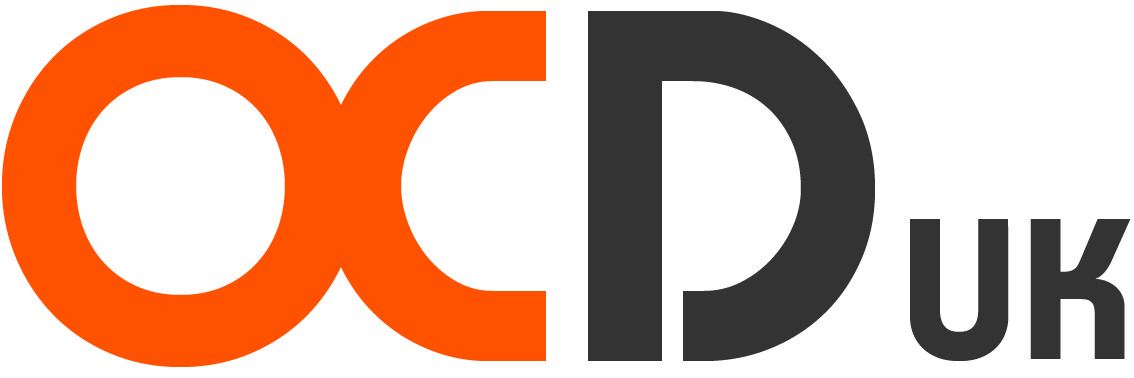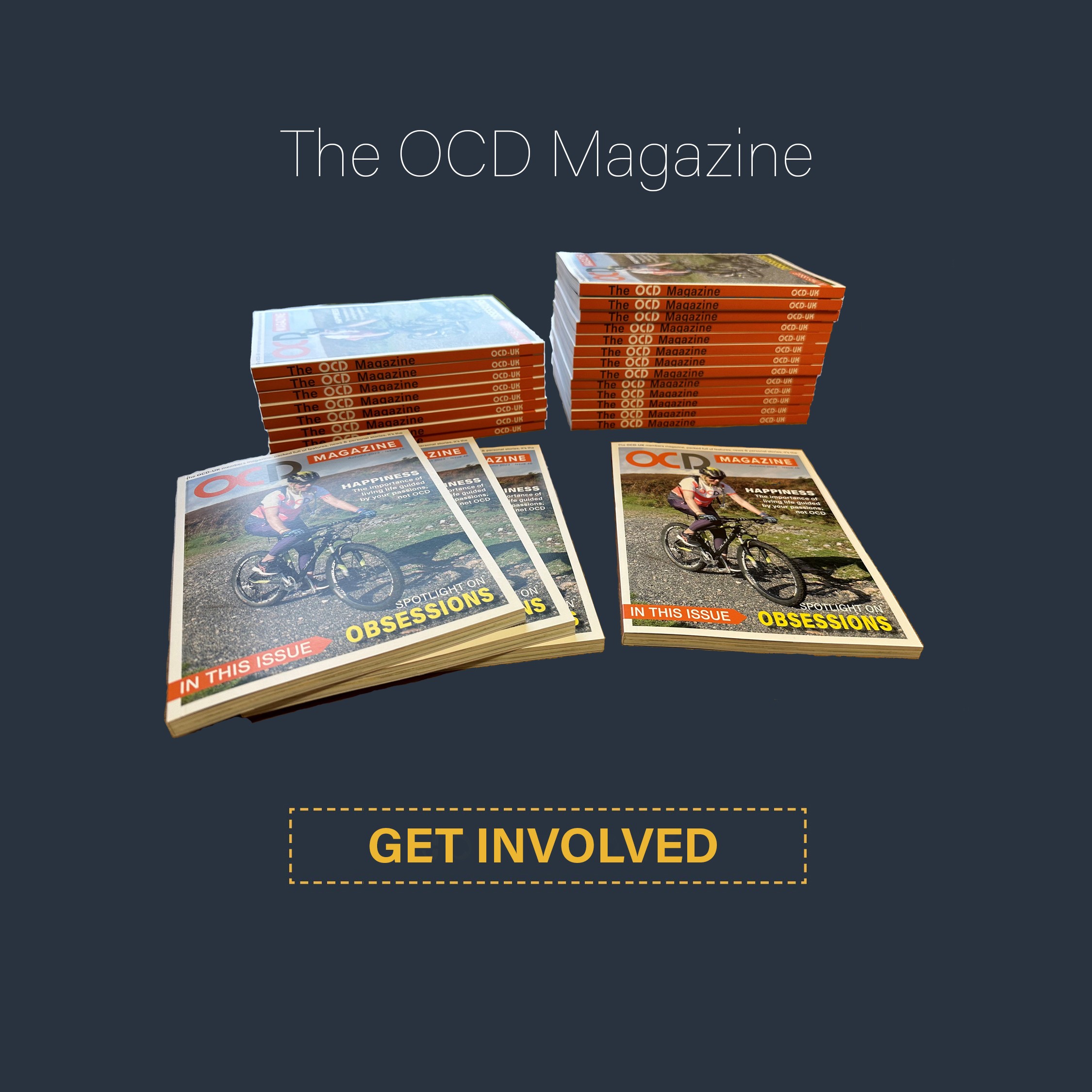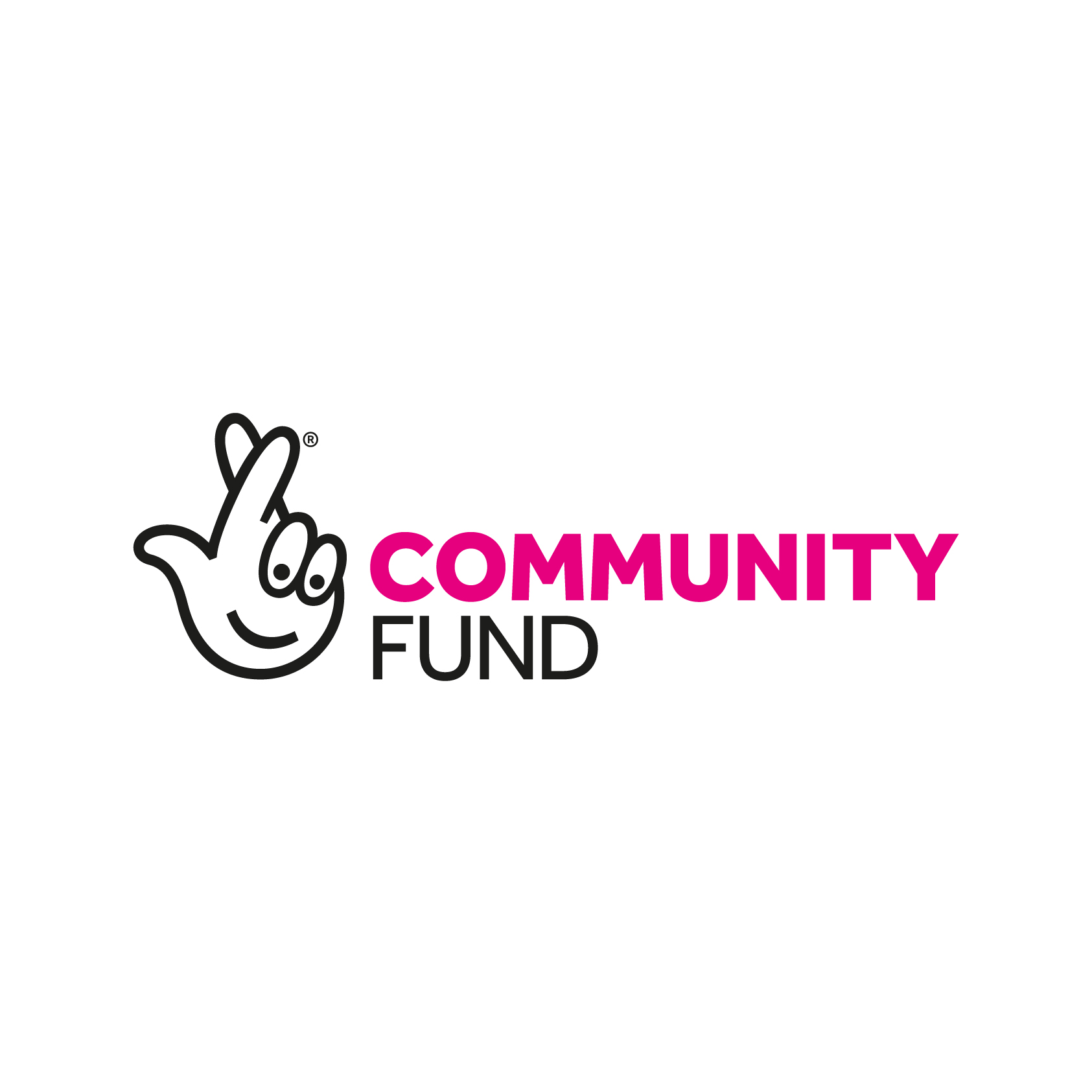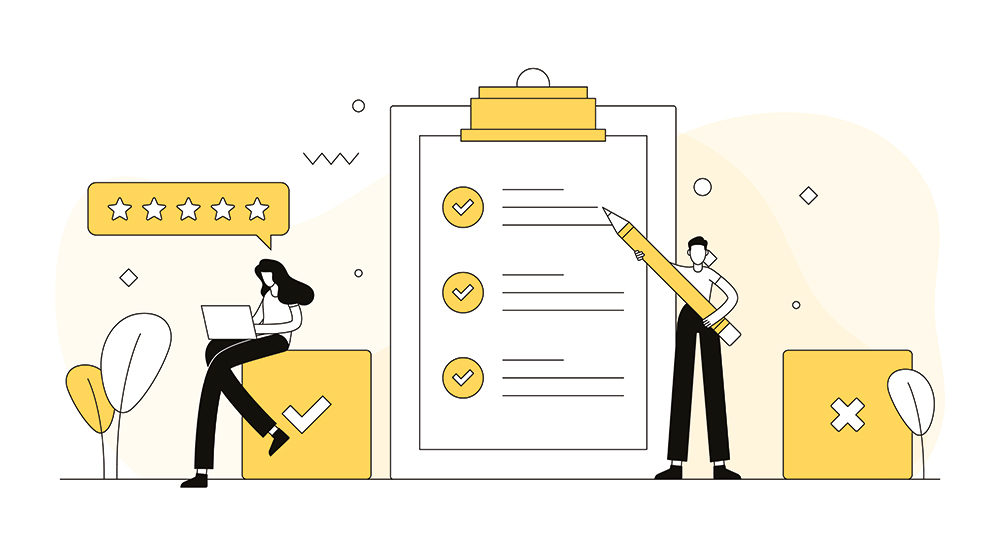Friend of OCD-UK, Dr Lauren Callaghan, is currently residing in Australia and inspired by the struggles we have been posting about wanted to try and help. So via Instagram she's recently started posting a series of daily coping strategies and tips which she's kindly given OCD-UK permission to replicate on the website.
Lauren is also one of the authors of the excellent self-help book, OCD, Anxiety and Related Depression: The Definitive CBT Guide to Recovery which is available through the OCD-UK website.
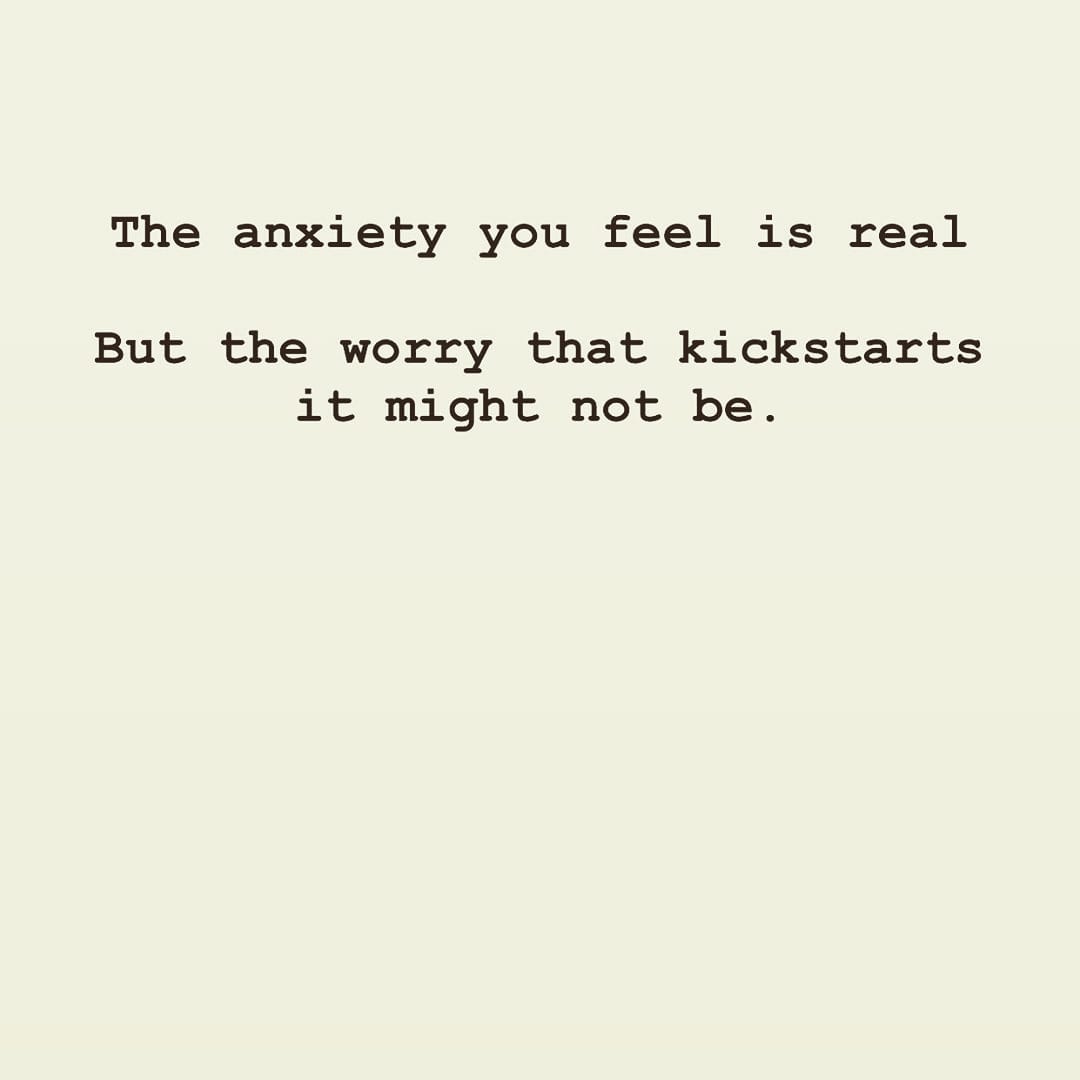
I, and the therapists I know, never doubt that our clients feel anxious. Everyone feels anxiety, some more than others, some more intensely and more frequently than others. What you feel is real, the physical sensations and the emotional distress – and at times it feels that it might actually overwhelm you. It won’t, because anxiety is a normal human experience – but it can be very unpleasant.
The anxiety you feel is real. BUT, it is very possible that what you feel anxious about – the thing you fear or worry about, is not real, or it can’t be changed. If it is in the future, it hasn’t happened yet. If it is in the past, it can’t be changed. This is what we try and challenge in CBT – the thing that is causing the anxiety – and the anxiety should reduce as a consequence.
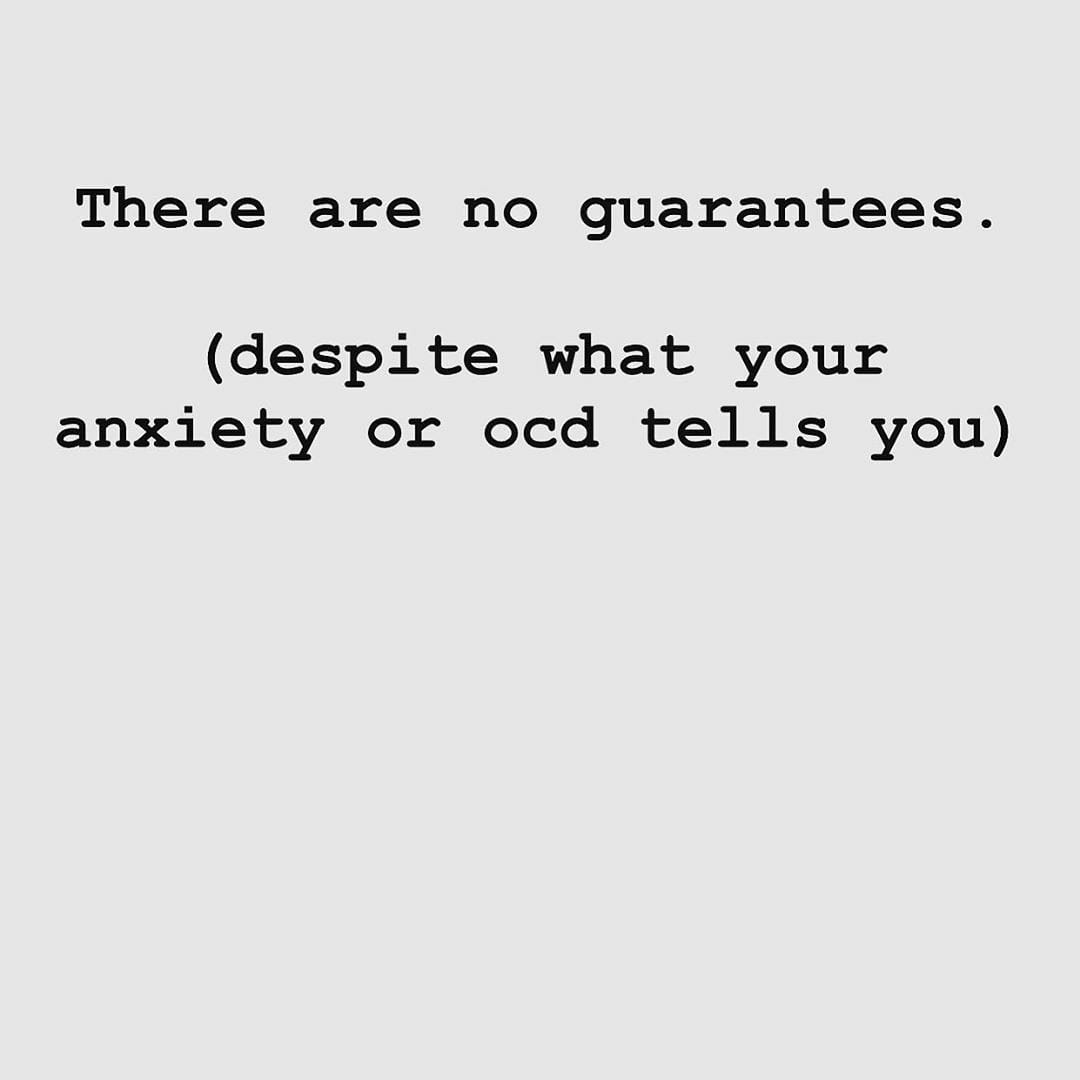
Seeking guarantees is another common problem in anxiety and OCD. Anxiety and OCD love to search for guarantees – the guarantee that something bad won’t happen, the guarantee that you won’t feel anxious in a specific situation, the guarantee that you won’t cause anyone any harm, the guarantee that you won’t say something stupid, the guarantee that you or someone you love won’t get COVID-19.
The thing is that nothing in life is guaranteed, even things that seem very likely or are a ‘sure thing’. Anxiety loves to ask you for guarantees which is why you develop safety behaviours, rituals or avoid things because you are trying to live up to the guarantee that something bad won’t happen (whatever that might be – it could even be feeling anxious or a panic attack!).
No matter what you do here, searching for a guarantee will end in more anxiety because it is an impossible task. Try and notice if your anxiety or OCD is asking you for a guarantee, because if it is, it is another trick and will not help in the long term.
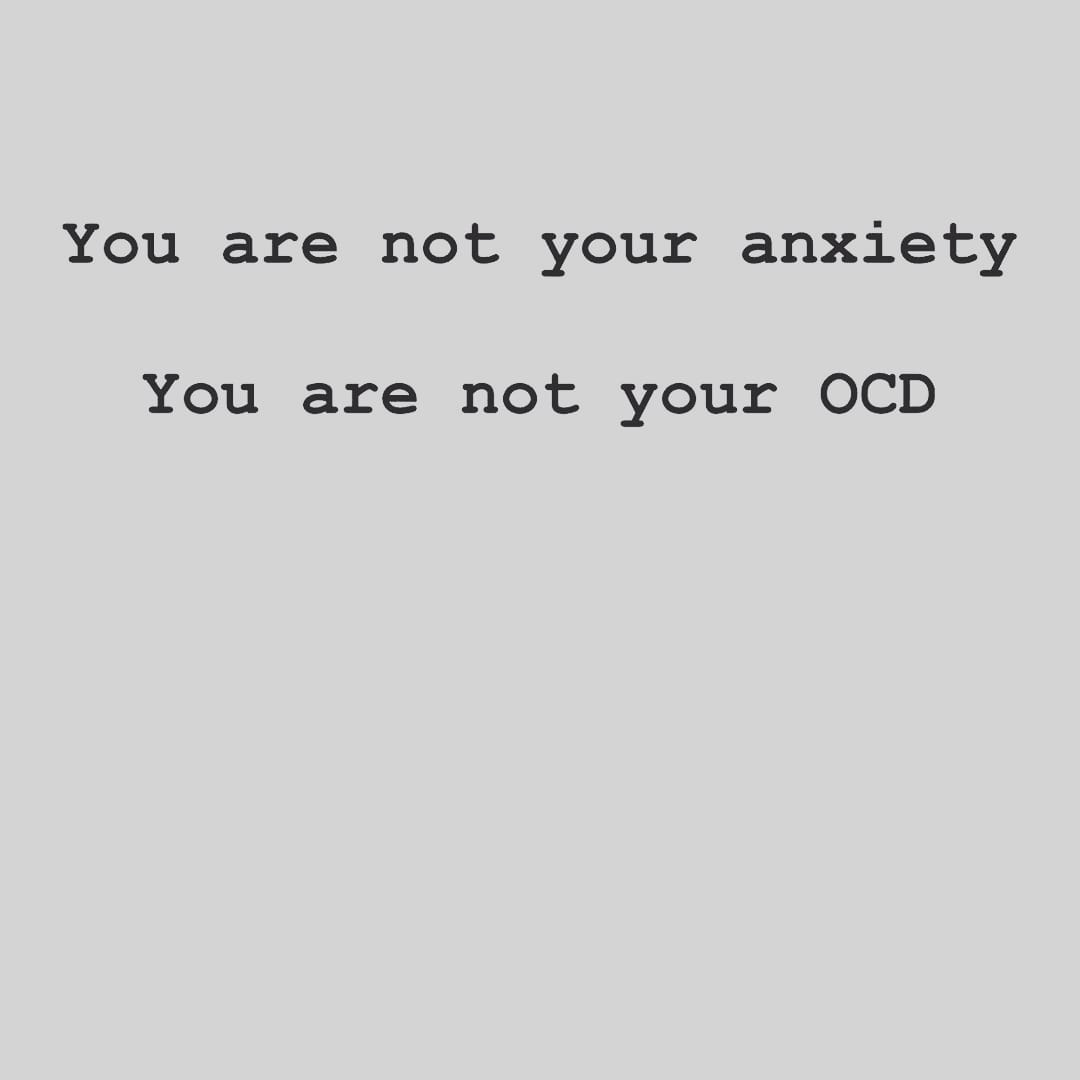
I have worked with a lot of people over the years helping them overcome their anxiety and obsessional problems. One thing that keeps coming up is that people find it hard to separate themselves from the anxiety or obsessions. They’ve often had the anxiety or OCD so long they don’t know what it feels like to not have it. But this does not mean that it is your identity or that it defines you.
You define you. The anxiety or OCD may be part of your experiences, and may have been present for as long as you know. But you are still many things outside of this. You are you.
Don’t become defined by your anxiety or OCD. Accept it, live with it, know that it can be part of your identity if you choose it to be, but it does not own you. Your value and worth far exceeds your anxiety or OCD.
You are you
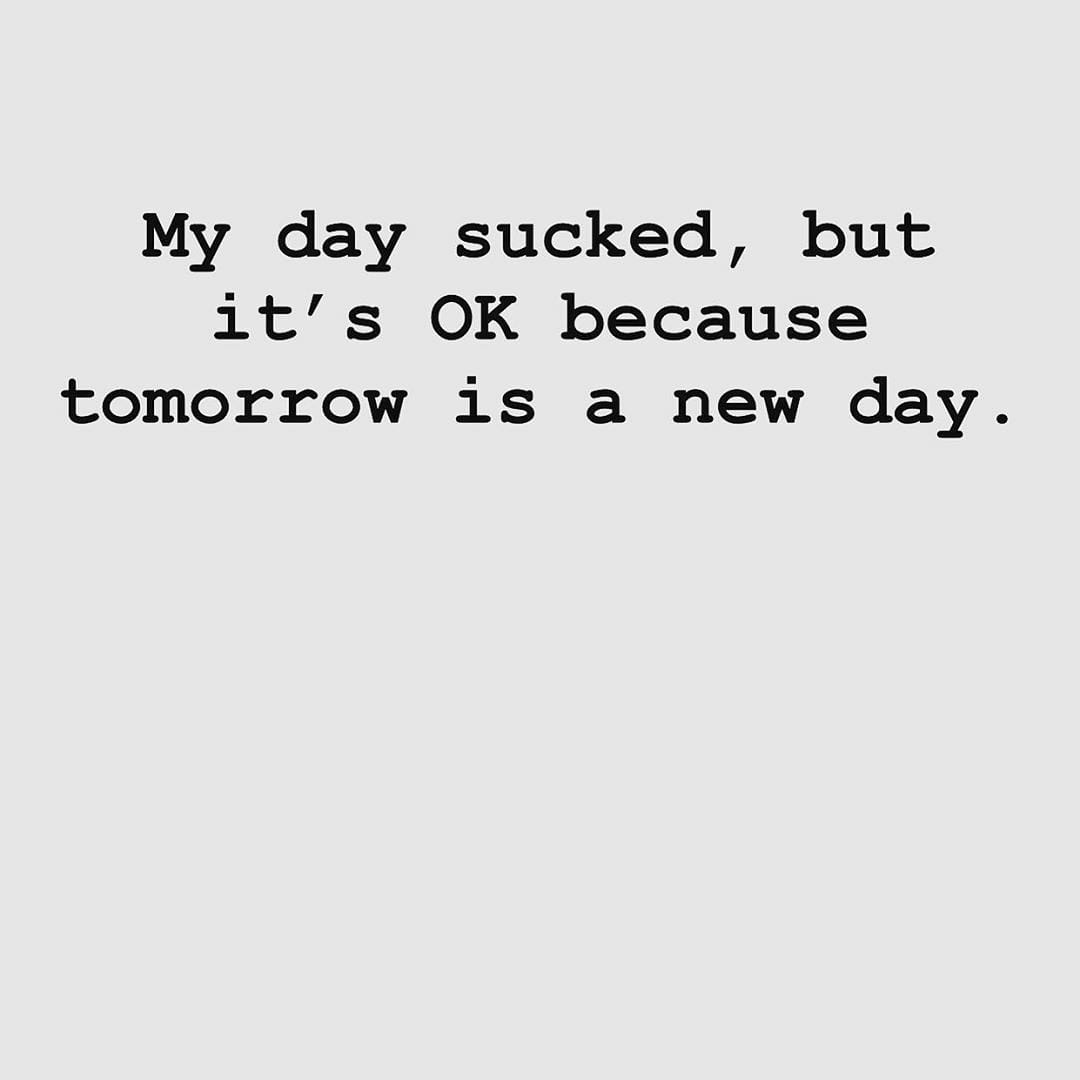
So, we all have days that don’t go as planned – whether its because of anxiety or obsessions causing havoc, feeling low and not having the motivation to do what we have to do, or just because sometimes we just have days like that.
I had a tough day today – being at home under ‘lockdown’, and after not sleeping well (much last night) I didn’t have the enthusiasm or motivation to approach the day, I didn’t achieve much and wasn’t very effective. But you know what, it’s OK. We can have days that are off, when we don’t feel right, when we can’t get it together. If these happen all the time you should probably speak to someone for more help. But if happens every now and again (and probably a bit more frequently under current climate) then give yourself a break. It’s OK and it happens to everyone. Just get through the day, change your expectations and the next day will be different, and most likely better.
Stay safe people and be kind to yourself
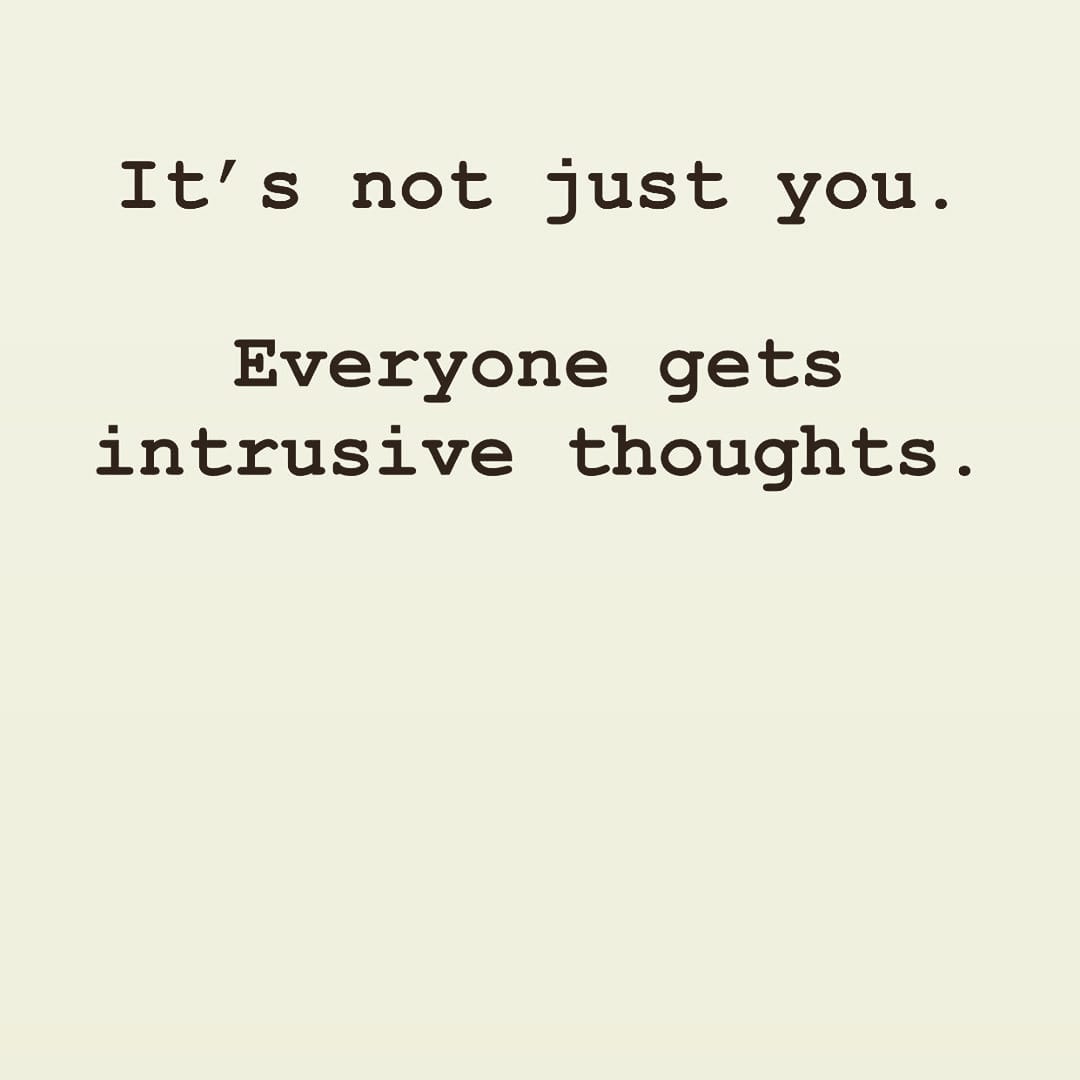
Whilst they are predominantly talked about in OCD and other obsessional problems, everyone gets intrusive thoughts (or images) – me, you, your friends, family, colleagues, enemies ….. Intrusive thoughts (or images) are uncontrollable thoughts that pop into your head uninvited. They can be pleasant (think of when a positive memory popped up for no reason), or unpleasant (as is usually the case in OCD type problems). So it’s not just you, weird or distressing as your intrusive thoughts might be.
You might get them more frequently, and the content might vary, but everyone gets them. So don’t believe this is something that only you experiences, and having intrusive thoughts does not mean you are defective or abnormal in anyway. EVERYONE GETS THEM – they are a normal part of the human cognition process.
Whilst they play a different role in the obsessional and anxiety disorders model and we focus on that in treatment sessions, therapists should never tell you that they will go away. You are human and will always have intrusive thoughts. Hopefully in the future they won’t cause the distress they might do now, but they are normal and expected in life.
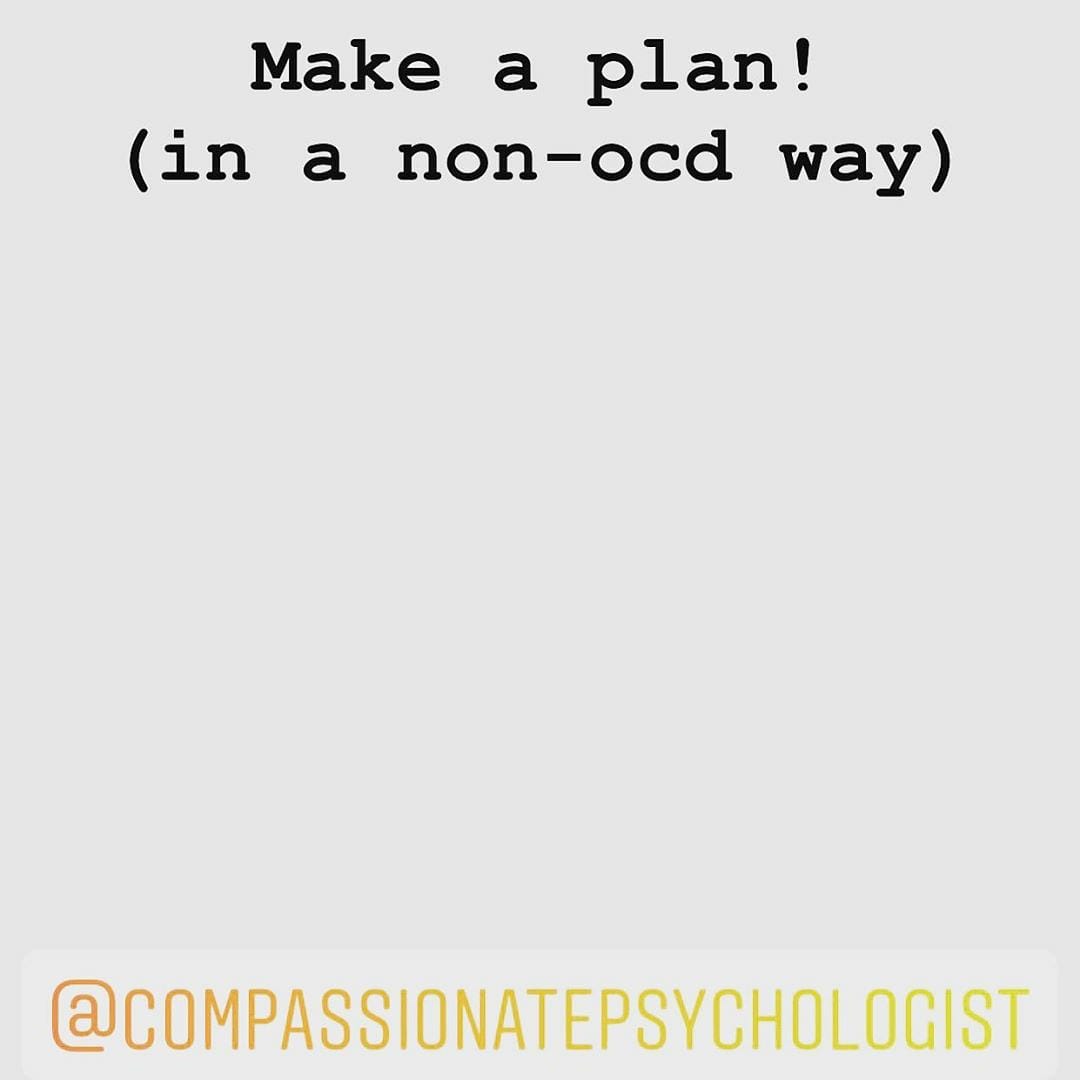
This is a period of great change for everyone – wherever you are around the world you are likely in some form of lockdown at home, or social distancing at best. You will have a lot more time on your own and at home, and there is nothing that worries, intrusions, obsessions or doubts like more than empty time! They can run amok and cause havoc and make you feel very anxious and distressed.
The best thing you can do is have a plan for the day, the week, and try to stick at it. Get up in the morning, have a shower and get changed into ‘day’ clothes, eat breakfast and start work or writing your blog, or whatever you have to do. It can be tempting to just loll around and take the day as it come, but a plan will make you more productive and keep the worrying thoughts at bay. Make one for the week – keep it realistic and flexible, and include breaks for lunch and book in some zoom or skype calls with family and friends.
If you don’t have any tasks that need completing, make some goals for each day, practising a skill or a new hobby (for example I’m resurrecting my role as a Connect Four champion).
(NB – if you have OCD and are prone to list writing, and recording things in detail, then only make the plan for every hour and try to keep it as open or flexible as possible. If it becomes an OCD problem on it’s own, then stop it.)
Stay safe and well.
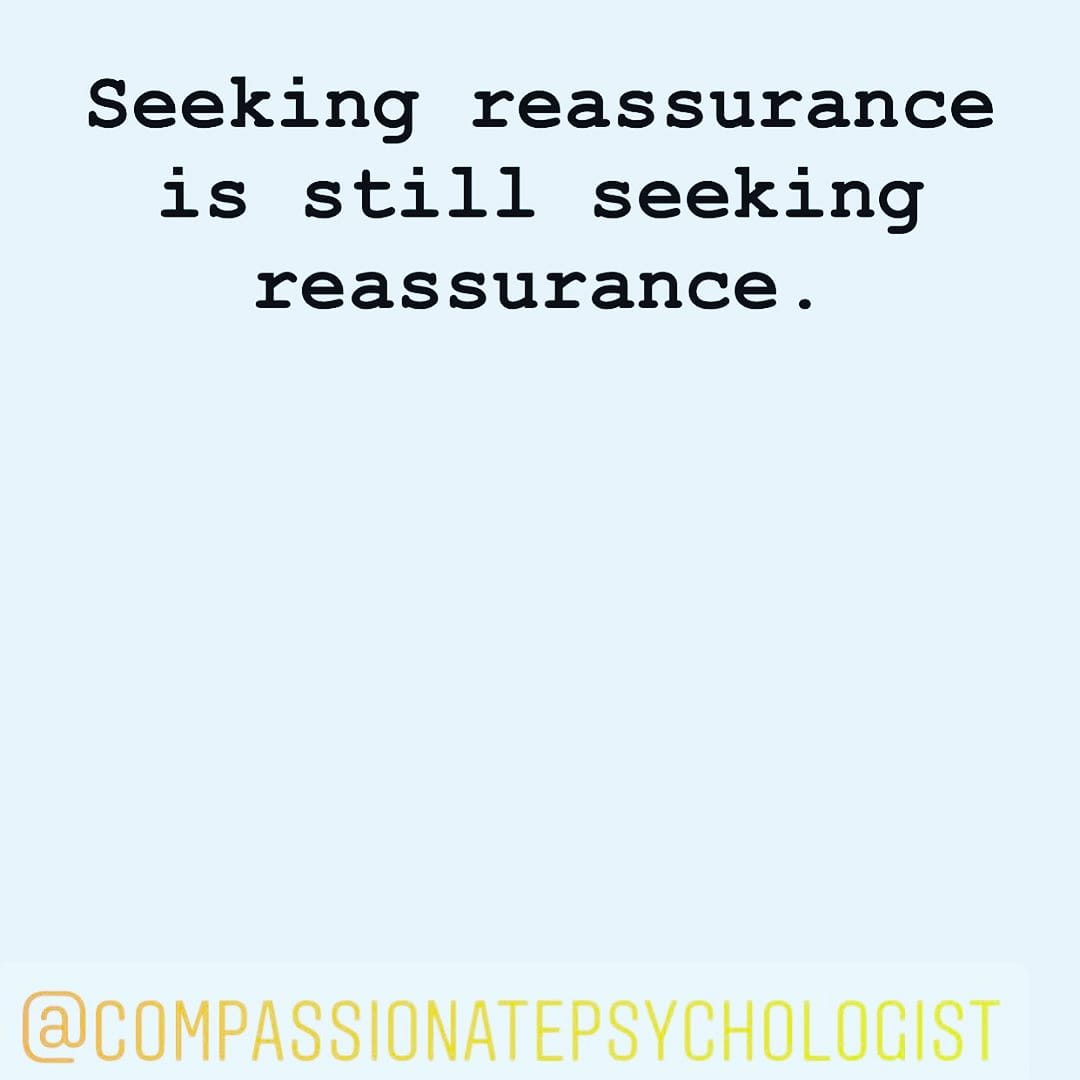
In anxiety, and especially OCD, seeking reassurance is part of the problem. It is a way of propping up anxieties without testing them out and undermines your confidence in your judgment.
During these stressful times it can be tempting to seek more reassurance from others or the internet– that we will be OK, that our loved ones will be OK, that we haven’t passed on the virus, that we are clean enough, that we wash our hands enough and for the right amount of time …..and so on. It can be tempting to seek reassurance for a quick fix, but please understand that it is not helping.
If you are seeking reassurance for an anxiety or obsessional problem it is not helping you – even with the threat of COVID-19. You are just reassuring the anxiety or OCD and giving it more room to take hold. Not only that – the relief never lasts. It might feel good in the short term, but you will come back wanting more and more and more…..well, you get the drift.
Take a breath, pause, and try and notice when you are seeking reassurance. Ask yourself – is this really for me, or is this to make my anxiety problem go away (for a bit)?
If it is the latter, then try your best to either hold off seeking reassurance or reduce how much you are doing it. It is hard, but it will help you overcome your anxiety in the long term.
Take care and stay safe
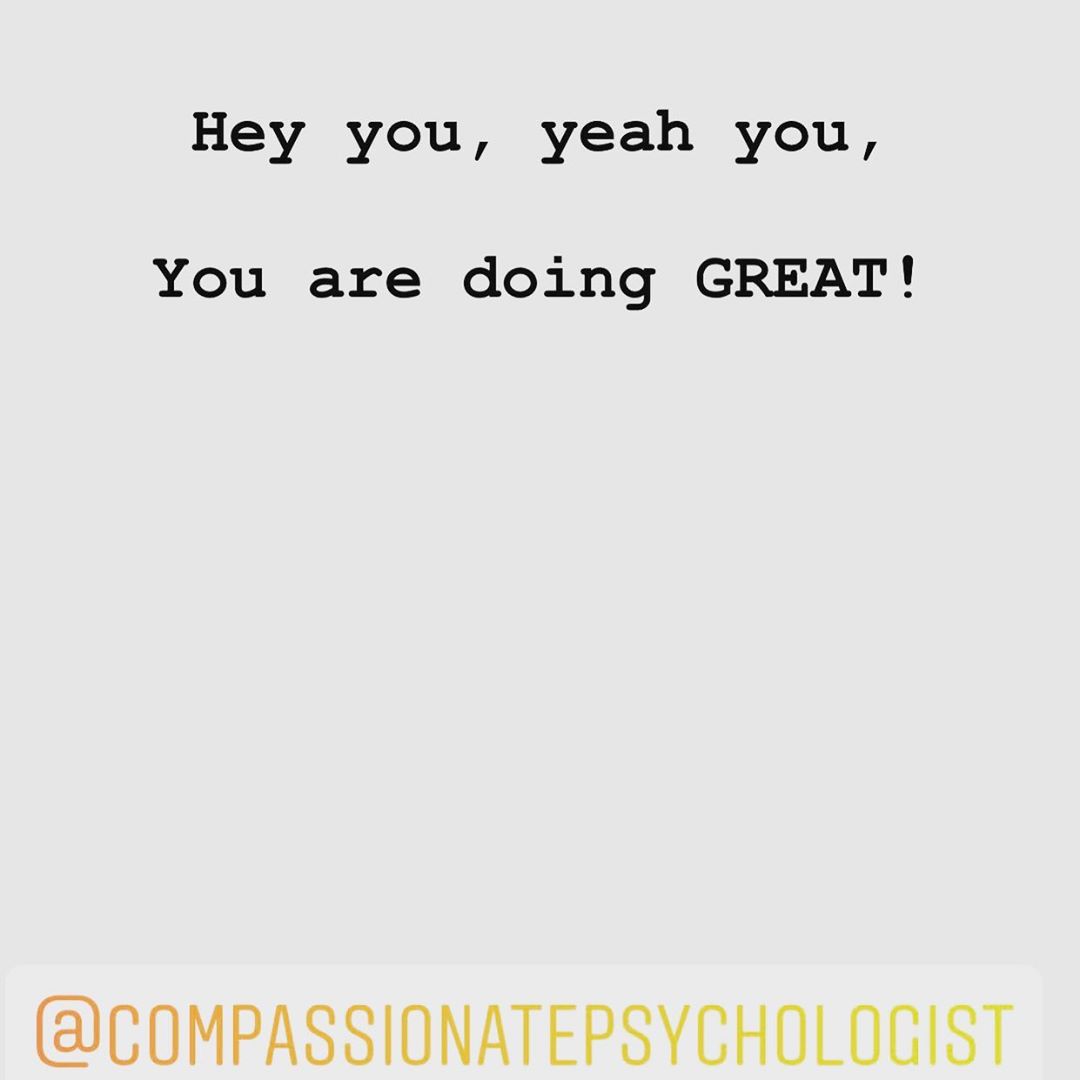
This is a strange time for everyone all over the world. We are being told to stay home, socially distance ourselves and access to important services has been suspended, including psychological treatments for those with mental health problems. It is what it is, frustrating as it may be.
Amongst all of this, please remember you are doing great! You are here. You are hanging on. There will be tough days, there will be easier days. There will be days when you are motivated to challenge yourself, and there will be days when you just can’t face the idea of challenging your anxiety. There will be days when your obsessions are quiet and you feel ‘normal’, there will be days when your worries and obsessions are raging and won’t give you a moment’s peace.
You are doing great by getting through each day at a time. You are doing great by surviving the anxiety and obsessions. You are doing great by tolerating what you can and distracting yourself when you need too. You are doing great by getting up each day and doing what you need to do. You are doing great.
Well done you. Keep up being great.
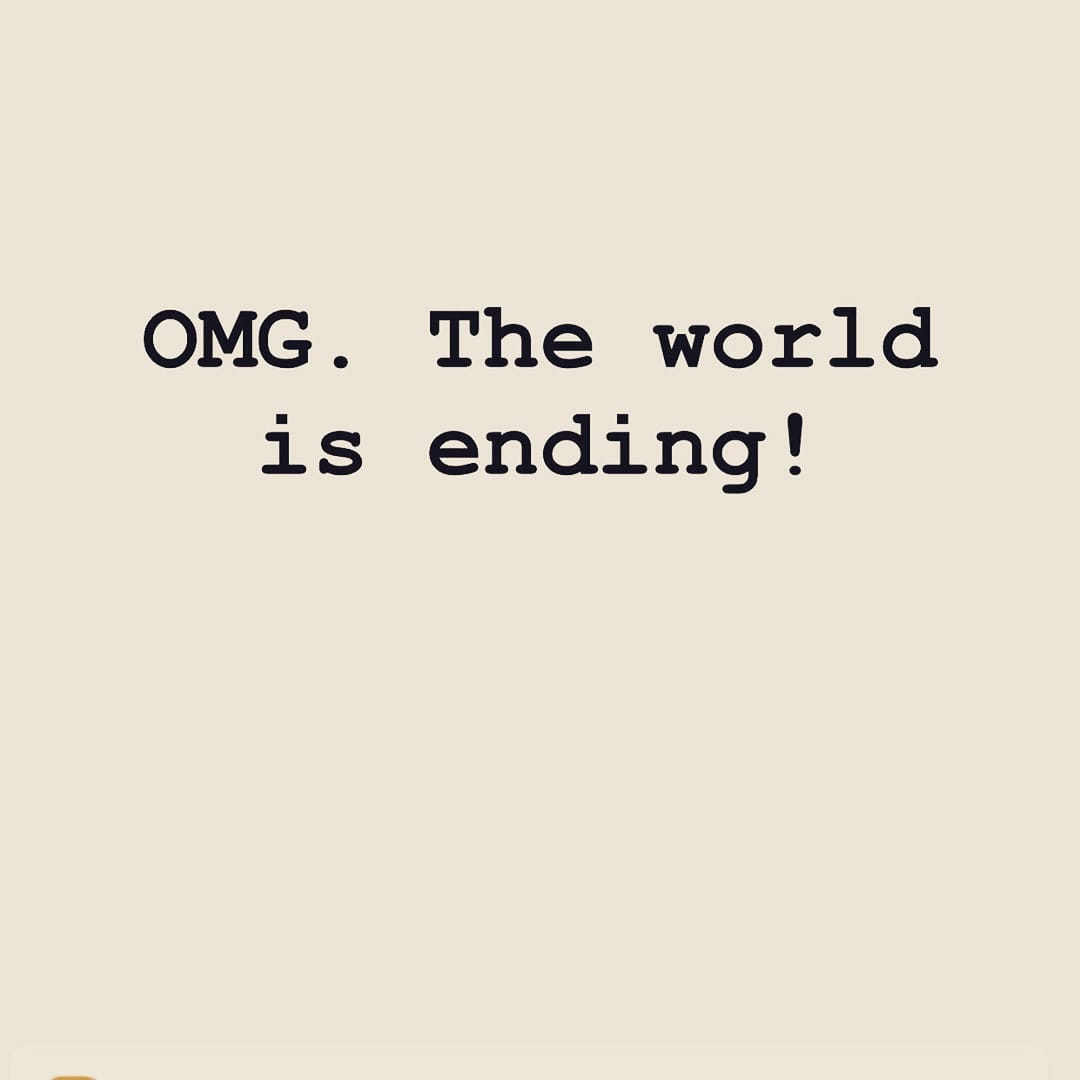
OK, so we know the world is not ending, but there are some serious things shaping our world and immediate future. I put that statement as an example of Catastrophising – a way of thinking that leads you to think the worst outcome will happen, and thus causes you to feel more anxious and depressed. Catastrophising a common thinking error in anxiety and obsessional problems, although you don’t have to have an anxiety or obsessional problem to engage in this type of thinking.
This pandemic will no doubt give rise to a lot of catastrophising – thinking the worst will happen to ourselves, our loved ones and friends, our jobs, our financial state…… and so on. If you have health anxiety, you might worry about your own health and demise; if you have OCD you might worry about becoming infected or infecting others and causing their death; if you have GAD you might worry about all of the above!
Whilst it is easy to jump into a catastrophising mindset, remember you never know what will happen. You cannot predict the future – whether it is a good or bad outcome. You might have an idea, but until it happens, you just don’t know. No one does. So, it is better to add some flexibility into your thinking. Instead of thinking ‘the world is ending’, it would be better to think ‘the world is changing – it is unknown and scary but it will go on in some form’. If you are thinking ‘I will die’, you are better thinking ‘I may get ill, but it is unlikely that I will die’ (based on statistics). It is not about pretending everything is OK, it is about acknowledging that you don’t know what the future holds – good or bad.
Stay safe people.

This pandemic will create an ongoing and constant exposure experience for many people with anxiety, OCD, health anxiety and GAD. They will be forced to face their fears, whether they had planned to or not. Whilst it may not have been your preferred option, an exposure opportunity is still an opportunity, and you can’t get much better than a pandemic for a ripe exposure setting!
For those of you who are unsure, ‘exposure’ in CBT is when people are asked to face their fears head on without engaging in any safety behaviours, rituals of avoidance. Exposure exercises are integral in the treatment of anxiety and obsessional problems, and whilst they are often planned out in treatment, some of the best exposures happen when they are not expected.
So, those of you who are forced to face their fears, whether it is contamination or harm worries, hygiene worries, health worries, or any other worry with content related to COVID-19 – use the opportunities to let the intrusions or worries be there, and not respond to them – or if possible – do the opposite!
For example, if you are worried about your health, spend 10 minutes focusing on your body and any twinges you notice without googling COVID-19 symptoms. For those of you avoiding anything about COVID-19, leave the news on TV for the day. For those of you worried about contamination, only wash your hands for 15 seconds each time for a whole day.
For those of you plagued by worries about COVID-19, record your worries onto your phone and play them back to yourself for 15 mins a couple of times a day (exposure to worries). These are only examples, but you get the drift. Just make sure your exposure exercises target the specific thing you are worried about – or it won’t work. You’ll know if you are doing exposure – you will feel very anxious, but if you don’t give into any safety behaviours or rituals or avoidance, it will subside pretty quickly.
If you are not worried about COVID-19, but are feeling anxious about something else, then use this at home situation to your advantage.
There is no time like the present for exposure exercises whatever your anxiety problem – build them in to your day and when the social distancing, lockdown, staying home has finished, you’ll be surprised at the progress you have made. Any opportunity to challenge your anxiety is a good one.
Stay safe.
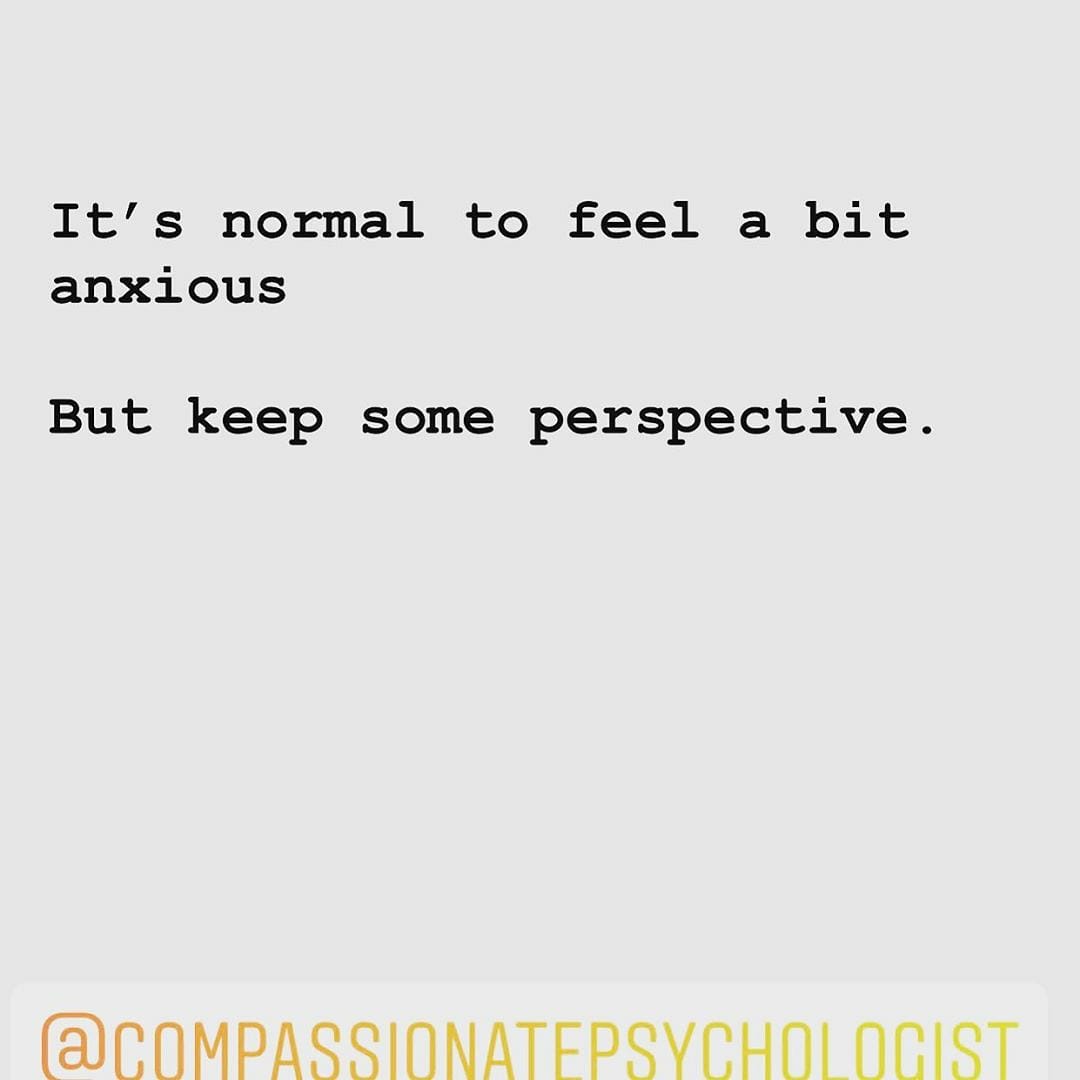
Everyone is feeling pretty anxious right now, and that is normal and to be expected. However, anxiety that is crippling and overwhelming, and preventing you from getting on with your day is not normal. That is problematic and needs to be addressed (as I am sure many of you would know). One of the most common techniques in CBT it challenging a person’s point of view (otherwise referred to as cognition, belief or perspective) and trying to get them to come up with some other new, more helpful and balanced ways to think about a situation.
Yes we are in a pandemic and yes, the future is uncertain. Yes there is a risk to your health, and those around you.
However, there it is also not as gloom and doom or as ‘end of the world’ as you might be thinking:
- Many people recover from COVID-19
- Many people are asymptomatic
- People will sadly die, but a very small percentage of people infected.
- The world has had pandemics before (Spanish Flu / Influenza) and the world and human beings survive.
- We have science and collaboration and communication and technology on our side.
- Scientists are working day and night to understand this virus and find a vaccine.
- We are told to self-isolate and stay at home because we know (thanks to science and communication and technology) that this is the safest thing to do for you and other people.
This will pass, and the world will keep turning. It might look and feel a bit different, but there have been many global revolutions that change the way we operate (WW1 and WW2 as a recent example), and sometimes (often) for the better.
Hopefully after this we can all club together to try and save this planet and its people.
Stay safe and stay inside.
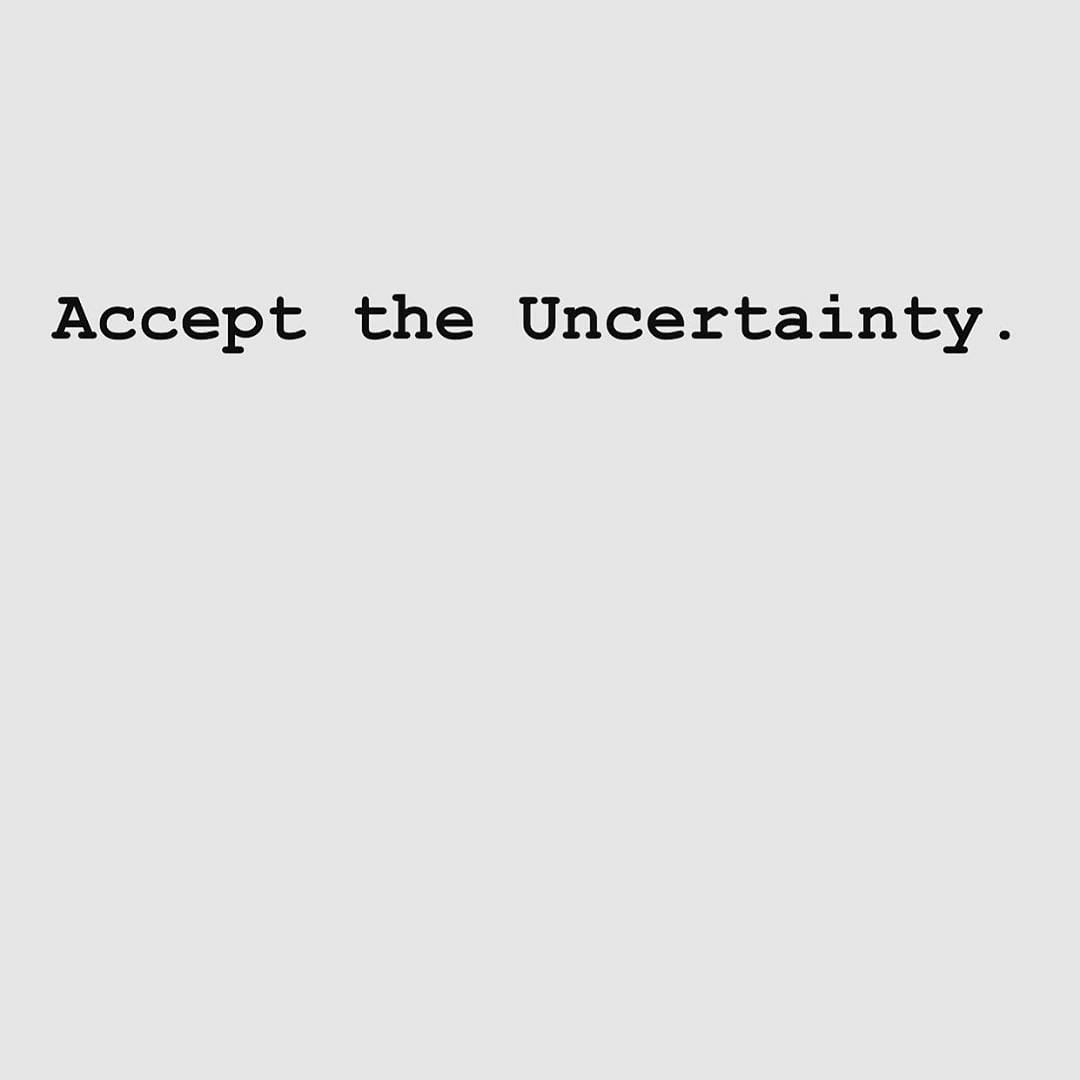
Anxiety and obsessional problems love uncertainty. They thrive on ‘not knowing’ what happens in the future or as responses to our actions. Socially anxious people worry about what other people think; those with OCD worry about the outcome of their actions or thoughts; those with BDD worry about other people noticing a flaw in their appearance; people with Generalised Anxiety Disorder worry about…well most things in the future!
We all feel uncertain about the future, even more so in the current COVID-19 crisis. But uncertainty in life is nothing new. In fact, pretty much everything in life is uncertain (apart from death, and taxes to take from well-known quote – although arguably taxes are also uncertain depending on where you live and how wealthy you are!). Uncertainty on a global scale feels very overwhelming, but again, it is nothing new. The world has been here before. Everyone remembers the recent global recession, and those of us who are a bit older well remember the Y2K panic! Also, WW2, the Cold War, international nuclear stand-offs to name a few more.
Therapists love to tell their anxious clients ‘you need to tolerate the anxiety’. Well, that’s all well and good but how do you suddenly start to ‘tolerate’ it when you have spent significant time trying to avoid or minimise uncertainty?
I suggest you are in fact tolerating it, it’s just that it is very uncomfortable, and you wish you didn’t have to. I prefer to tell people to ‘accept the uncertainty’, which in turn will increase tolerance. In acceptance, you often find a way through – acknowledging you cannot change what is uncertain, and that whilst it feels uncomfortable or unpleasant, it will not last forever (another certainty – nothing lasts forever!). This is tolerating uncertainty
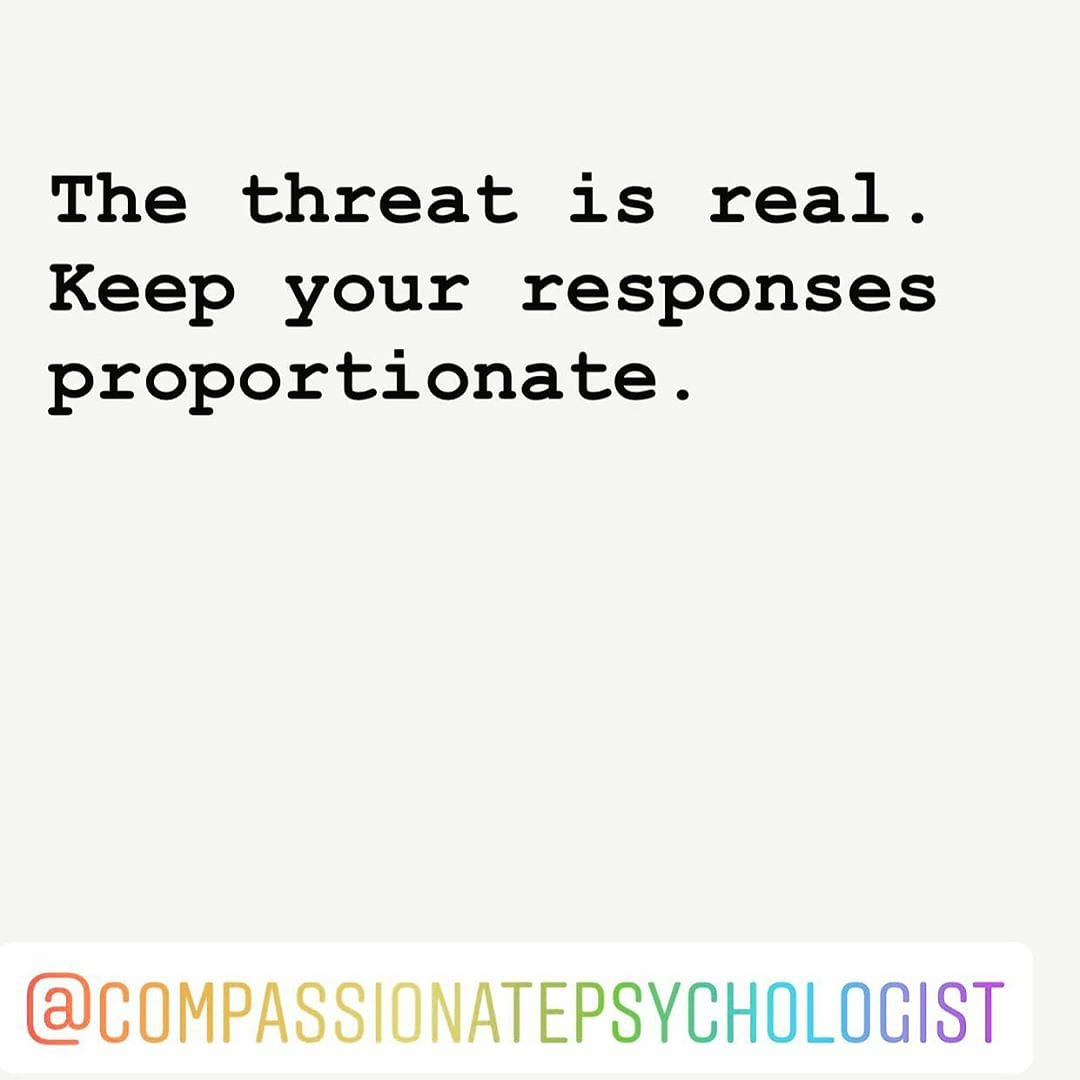
After working in the field of anxiety and obsessional problems for years, I know that many people suffering from anxiety, OCD and Health Anxiety will be finding the current climate particularly stressful. Even more so for those with contamination worries or those who worry uncontrollably about their health. Please remember that this situation is anxiety provoking for everyone – with or without an anxiety problem! So, I thought it might be helpful to post a daily reminder or helpful tip for those who are feeling anxious in the hope that some might find it helpful.
Therapists tell their anxious clients that the thing they are worried about - ‘the threat’ - is not real, or so miniscule that they shouldn’t worry about it, and that their responses are ‘disproportionate’ to the actual threat. Well, this time the threat is REAL. So what should you do now? If the threat is real you need to keep your responses proportionate to the threat. Wash your hand after being out, touching things outside, before eating and after using the toilet – but for only 20 seconds. Not 5 minutes. Not 20 times 20 seconds. Not until it ‘feels right’. Just 20 seconds. (set a timer if you need too). You should keep your distance from people and stay at home where possible, but you don’t need to shower or ‘decontaminate’ for 4 hours and wash your clothes 20 times if you have had to go out the front door. You can read the symptoms of COVID-19 but you don’t need to google check them every hour when you feel a sensation in your throat. You can buy groceries for a week, but don’t buy 500 rolls of toilet paper.
On the other hand, don’t avoid the threat either (pretend it is not real or test it out) – don’t go around pretending everything is as it was. Avoidance can be just as dangerous as overcompensating responses (possibly even more so with a pandemic). Please, be sensible, and measured in your responses.
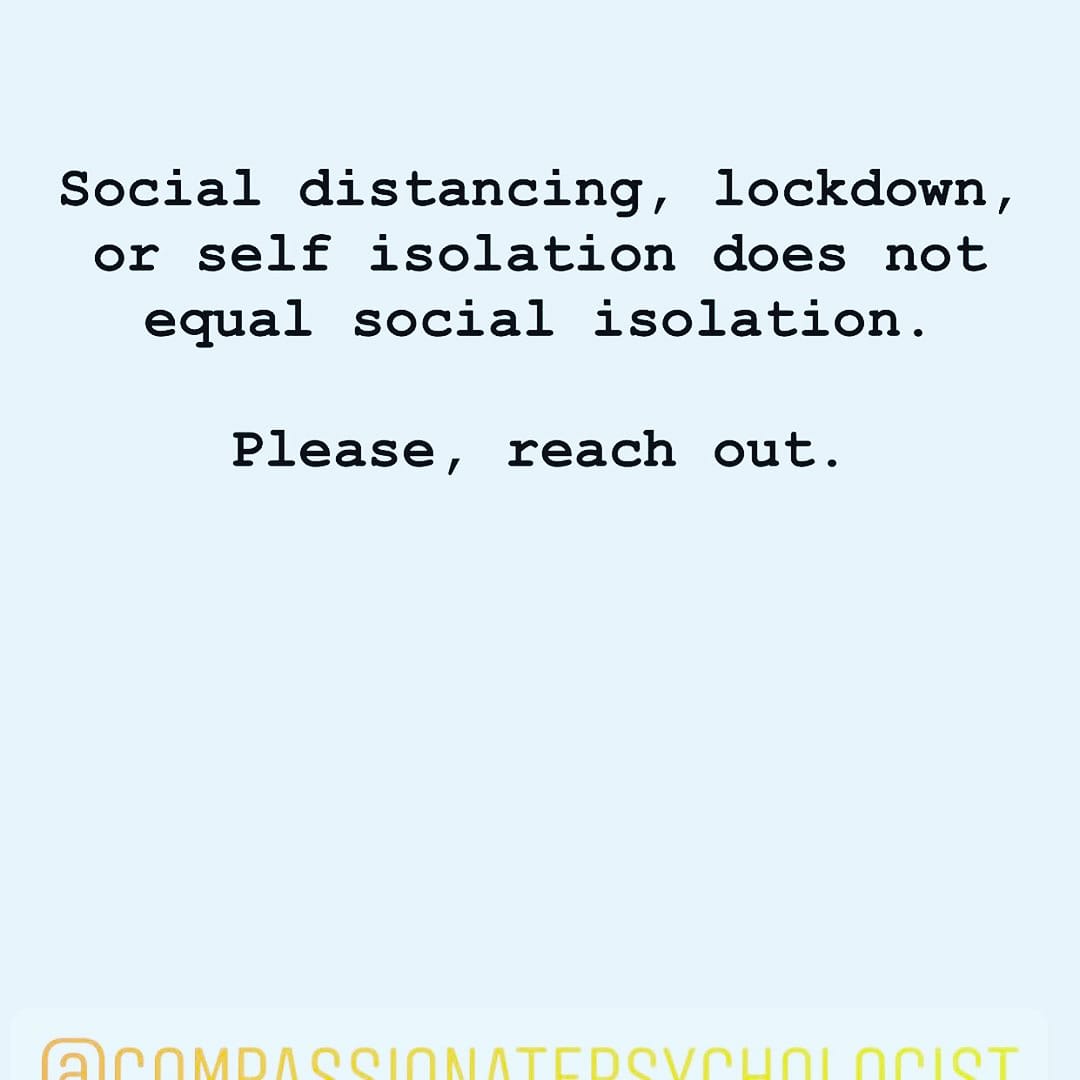
In anxiety and OCD problems, people who are left alone with their worries and intrusive thoughts can spiral quickly into a difficult and distressing place. For anyone suffering from an anxiety or obsessional problem, depression or indeed any other mental health problem, being disconnected and isolated from other people exacerbates their problems.
Social distancing, self isolating, quarantine, or a city lockdown does not mean you should disconnect from others. If you know someone suffering from anxiety or OCD, please reach out to them. Check they’re coping OK. Offer them support (not reassurance 😊), and have a catch up. If you are suffering from anxiety or OCD, please reach out to someone. People don’t always know that you need help and they most likely need the connection as much as you do.
These days we have many ways of connecting with someone – facebook, insta, twitter, text, tiktok (still catching up with that one), email, and even old skool talking on the phone. Take a breath, and connect with someone – it might be what helps both of you through the day.
